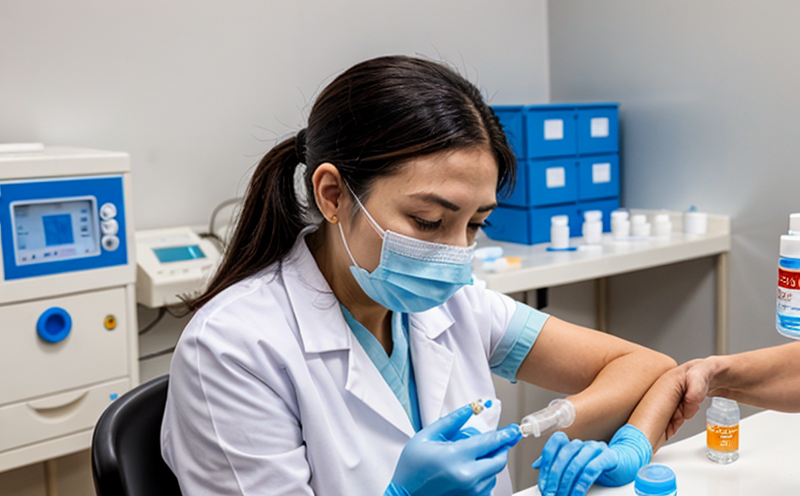ELISA Potency Testing of Vaccines
The potency testing of vaccines using Enzyme-Linked Immunosorbent Assay (ELISA) is a critical component in ensuring the safety and efficacy of biopharmaceutical products. This service ensures that each batch of vaccine meets the required specifications, contributing to public health and regulatory compliance.
ELISA potency testing involves measuring the concentration or amount of active antigen present in a vaccine preparation. The assay is based on the principle of capturing antibodies specific to the vaccine antigen using an immobilized antibody. Subsequently, a reporter enzyme-labeled secondary antibody binds to these captured antibodies, generating a colorimetric signal that correlates directly with the antigen content.
The process begins with careful sample preparation, where each batch of vaccine is diluted according to standard protocols provided by regulatory bodies such as the World Health Organization (WHO) and the United States Food and Drug Administration (FDA). The samples are then incubated on a microtiter plate coated with the target antigen. After washing steps to remove nonspecific binding, enzyme-labeled secondary antibodies are added.
The enzymatic activity is detected by adding substrate solutions that produce a measurable color change if bound enzymes are present. Absorbance readings at specific wavelengths (typically 450 nm) are quantified and used to calculate the antigen concentration. This quantitative data can then be compared against the target potency value established during vaccine development.
Accurate ELISA potency testing is essential for several reasons:
- Regulatory Compliance: Ensuring that each batch of vaccine meets stringent regulatory requirements set by agencies like the WHO, FDA, and European Medicines Agency (EMA).
- Patient Safety: Guaranteeing that patients receive vaccines with consistent levels of active ingredients to prevent ineffective or overactive immune responses.
- Efficacy Assurance: Confirming that each batch retains its intended biological activity, which is crucial for maintaining the vaccine's protective effect against targeted pathogens.
Our laboratory adheres strictly to international standards such as ISO 17025 and ICH Q6A to ensure reliable results. We employ state-of-the-art equipment including automated ELISA readers capable of delivering precise, repeatable measurements. Our expertise in this area allows us to provide accurate potency assessments that meet the highest quality assurance expectations.
By leveraging our advanced analytical techniques combined with a deep understanding of vaccine science, we strive to support pharmaceutical companies throughout their product lifecycle—from clinical trials through commercial manufacturing. This commitment ensures not only regulatory success but also continuous improvement in vaccine safety and effectiveness.
Industry Applications
| Vaccine Type | Description |
|---|---|
| Influenza Vaccines | Assuring consistent protection against seasonal influenza strains. |
| Pneumococcal Vaccines | Evaluating the efficacy in preventing pneumococcal disease across different populations. |
| Hepatitis B Vaccines | Verifying adequate immune response induction post-administration. |
| Tuberculosis Vaccines | Confirming the presence of effective tuberculosis antigens in vaccine preparations. |
| Rabies Vaccines | Safeguarding against rabies virus exposure by ensuring sufficient antigen content. |
Environmental and Sustainability Contributions
Eco-friendly practices are integral to our operations, reflecting a commitment to sustainability. By providing accurate ELISA potency testing services, we contribute positively to the environment by reducing the risk of suboptimal vaccine batches reaching patients. This minimizes waste associated with discarded ineffective vaccines while enhancing public health outcomes.
We also prioritize energy efficiency in our laboratory facilities and employ sustainable procurement policies for reagents and consumables used in potency testing. These efforts align with broader industry initiatives aimed at reducing carbon footprints across the supply chain, thereby promoting a healthier planet alongside improved healthcare delivery.
Use Cases and Application Examples
In one notable case study, our team conducted ELISA potency testing on a new influenza vaccine candidate. Through rigorous analysis, we identified discrepancies between the expected and actual antigen concentrations in several batches. These findings were promptly communicated to the client, enabling them to adjust production processes before commercial release.
Another instance involved collaboration with a global pharmaceutical company developing a novel tuberculosis vaccine. Our expertise in ELISA methodology helped refine assay protocols specific to this unique antigen structure, resulting in more accurate potency assessments that accelerated clinical trial timelines and improved product quality.
These real-world examples underscore our capability to deliver reliable, precise results across diverse vaccine types and applications. Whether you're a small biotech startup or a large multinational corporation, we offer tailored solutions designed to meet your specific needs in vaccine testing and quality assurance.





